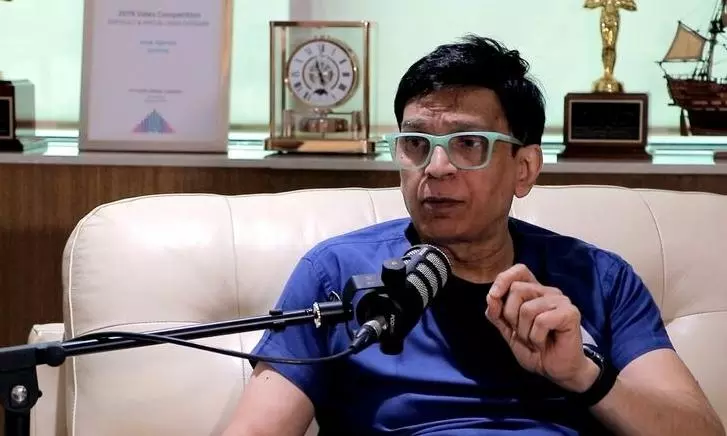The global vision that took Dr Agarwal's Eye Hospital from Chennai to Africa and beyond
Dr Amar Agarwal traces the journey from a single clinic in Chennai to a fast-scaling healthcare enterprise with over 250 hospitals across India and Africa


Dr Agarwal sat down for a candid chat with The Federal for 'C-Suite Conversations'.
For Dr Amar Agarwal, Chennai isn’t just home — it’s the global capital of ophthalmology.
“Chennai is the Mecca of eye care,” he says, referencing the city’s concentration of world-class institutions like Sankara Nethralaya, Aravind Eye Hospitals, and his namesake, Dr Agarwal's Eye Hospital.
Ambitious targets
Dr Agarwal sits down for a candid chat with The Federal for YouTube program C-SuiteConversations, tracing the journey of his family-led hospital group that has grown from a single clinic in Tamil Nadu into a fast-scaling healthcare enterprise with over 250 hospitals across India and Africa.
The group now has its sights set on hitting 500–600 units by 2030 and performing more than 4,000 eye surgeries every day.
“My four sons have taken over the system,” he says. “I am the face, no doubt about it, but I only operate. They run the business.”
Family legacy in ophthalmology
Dr Agarwal’s family legacy in ophthalmology goes back decades. His grandfather, a top practitioner in Delhi, gave up a flourishing career to serve at the Aurobindo Ashram in Pondicherry.
His parents later moved to Chennai to be closer to him and set up a practice that eventually evolved into a nationally-recognised healthcare brand.
Also Read: TN Health Skills Summit 2025 focuses on digital healthcare future
Today, that legacy is being driven forward by the next generation. All four of his sons are ophthalmologists, and three also hold MBAs — from Stanford, Harvard, and Kellogg. Together, they are helping take the brand global while deepening its presence in India and Africa.
Close your eyes for 10 seconds. That’s blindness. And if we can reduce that even a little in our lifetime, we’ve done our job.
The group currently performs over 1,000 surgeries and sees more than 25,000 patients daily, a number it aims to quadruple by the end of the decade.
Pioneering work
What sets Dr Agarwal's Eye Hospital apart is not just its reach, but also its pioneering work in surgical techniques. The group has developed globally-adopted procedures like glued intraocular lenses (IOL), pinhole pupilloplasty, and PDEK — pre-Descemet’s endothelial keratoplasty.
“PDEK allows us to use just 25 microns of corneal tissue instead of the full 600 microns,” Dr Agarwal explains. “This helps us address the shortage of donor corneas while restoring vision with minimal intervention.”
Also Read: More donors, fewer transplants: Why TN govt hospitals trail private ones
But he refuses to take personal credit for these advances. “Innovation isn’t a solo act. If something truly new happens, it’s because the almighty wanted it to happen. We are only the instruments.”
Expansion in Africa
While many Indian healthcare companies are exploring expansion in Southeast Asia and the Middle East, Dr Agarwal’s group is taking a different route — Africa. With a population of 1.5 billion and healthcare access challenges similar to India’s, the continent has emerged as a key focus area for the group’s international growth.
Also Read: Gujarat: 17 patients complain of vision loss after cataract surgery; probe ordered
“Africa and India together represent half the world’s population,” he notes. “We just performed the first eye transplant in Zambia and opened an eye bank in Mauritius.”
Despite the complex regulatory environment — each country requiring its own licensing — the group views Africa as a natural extension of its mission.
Hybrid approach
In a sector where many leading institutions operate with a purely charitable ethos, Dr Agarwal's Eye Hospital has adopted a hybrid approach. The hospital network supports both paying and non-paying patients.
Through daily outreach camps, the group brings in patients from rural areas, offering free surgeries, accommodation, and care.
“No one can change the whole planet,” Dr Agarwal says. “But if we can make a small difference, that’s worth everything.”
Also Read: 'Madras eye' spike in TN: What is this disease, how can you prevent it?
In-house training
The group has also invested in addressing systemic manpower challenges. Its in-house college of optometry trains 300 to 400 students annually.
Graduates of this four-year, government-recognised course are deployed across the hospital network, especially in tier-2 and tier-3 towns, reducing the load on ophthalmologists and expanding service delivery capacity.
We’re at the tip of the iceberg. AI can help correct misdiagnoses and expand access in ways we couldn’t have imagined before.
Looking ahead, artificial intelligence is central to Dr Agarwal’s strategy for scalable, quality care. AI-powered diagnostic tools are being deployed in rural centres to detect eye conditions early and avoid misdiagnosis.
“We’re at the tip of the iceberg,” he says. “AI can help correct misdiagnoses and expand access in ways we couldn’t have imagined before.”
Also Read: With multiple lapses, HIV prevention and care pose big challenge in TN
The mission: restoring sight
From a family-run practice to a private equity-backed, publicly-listed healthcare company with global investors like Temasek and TPG, the group has undergone a dramatic evolution.
But, for Dr Agarwal, the mission remains rooted in something profoundly simple: restoring sight.
“Close your eyes for 10 seconds,” he says. “That’s blindness. And if we can reduce that even a little in our lifetime, we’ve done our job.”

